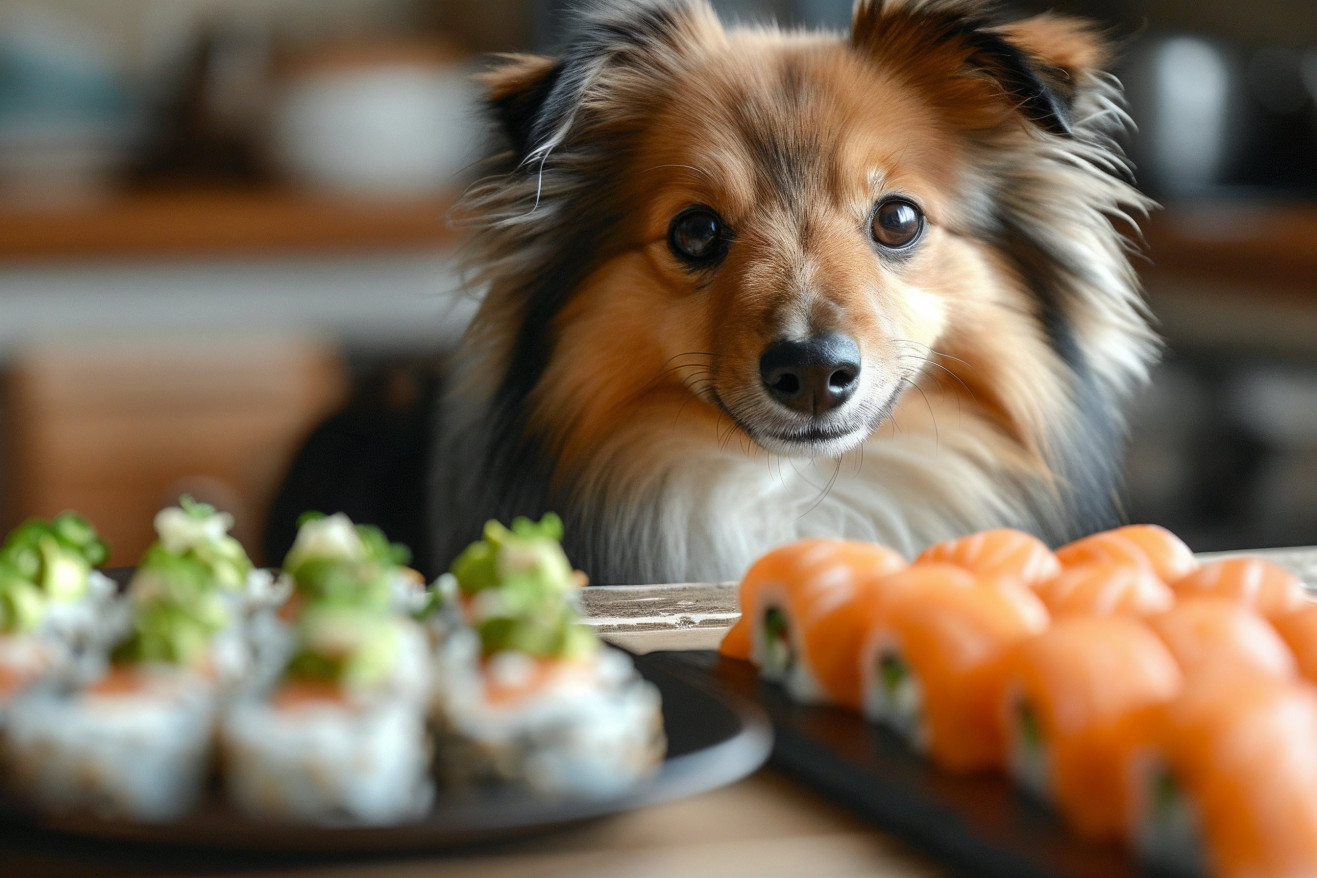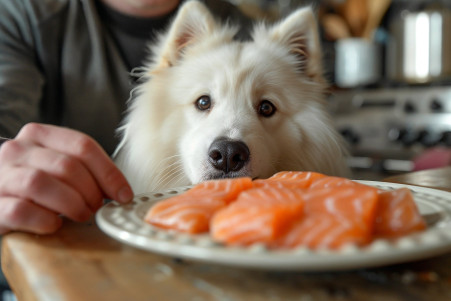Can Dogs Eat Sushi? Safe Ingredients & Risks Explained
2 February 2024 • Updated 6 February 2024

Sushi is a popular food for many people, but can you share it with your dog? The answer is yes, as long as the sushi includes cooked fish, dog-safe vegetables, and plain rice. However, raw fish should be avoided due to the bacteria and parasites that can be present. In addition, sushi that includes avocado, soy sauce, or wasabi should be kept away from dogs because these ingredients can be toxic.
In this article, we will be drawing on a wide range of veterinary and nutritional expertise to look at the sushi ingredients that are safe for dogs and those that may be risky. We will provide the scientific evidence for how certain sushi ingredients can impact your dog’s health, so you can know what to consider when deciding whether to share this Japanese treat with your dog.
Can dogs eat sushi?
Raw Fish Can Be Dangerous for Dogs
While sushi is a delicacy for people, raw fish can be dangerous for dogs. According to VCA Animal Hospitals, eating raw or undercooked fish can expose dogs to bacteria and parasites. One of the biggest risks is salmon poisoning disease, which is caused by a bacteria that is released by a parasitic flatworm that is found in certain types of fish.
Dogs can start showing signs of the disease within a week of eating infected fish, and symptoms include vomiting, diarrhea, fever, and lethargy.
The American Kennel Club also notes that raw fish can contain salmonella and listeria, which means it’s important to cook fish thoroughly to avoid these risks. It’s also important to know the signs of a fish-borne illness, which can include blood in the stool, fever, or sudden weight loss, and to take dogs to the vet right away if you suspect they have a fish-related illness.
When it comes to eating fish safely, both the AKC and Purina recommend feeding dogs fully cooked fish that’s been deboned and doesn’t have any added seasonings or oils. By feeding dogs fish that has a shorter shelf life, like salmon and whitefish, and preparing it properly, dog owners can give their pets omega-3 fatty acids that can make fish a healthier option for a treat.
Toxic Toppings: Seasonings and Condiments to Avoid
While it’s fun to spoil your dog with sushi, it’s important to avoid seasonings and condiments that could be toxic. For example, soy sauce is one of the biggest dangers to dogs because of its high sodium content, which can cause salt poisoning.
A-Z Animals explains the signs of salt poisoning, which include vomiting, diarrhea, and lethargy. The same article explains that even a teaspoon of soy sauce can be toxic, especially for dogs with kidney problems or those that are dehydrated.
Another popular sushi condiment, wasabi, is also a no-go. While not toxic, it can cause stomach upset in dogs, leading to symptoms like sneezing and vomiting, according to DogTime. VCA Hospitals explains that the heat of wasabi can be very uncomfortable for dogs and in some cases, can cause a severe allergic reaction.
Stick with plain purees like pumpkin or sweet potato that don’t contain any added seasonings to make sure your dog stays safe and happy with their sushi toppings. This way, you can make sure you’re giving your dog the flavors they love while keeping their meal safe and healthy.
Dog-Friendly Sushi Ingredients
If you’re making sushi for your dog, stick to dog-friendly vegetables like cucumbers, which PetMD says are non-toxic, hydrating, and low in calories. Cucumbers are a great option to add some crunch to your dog’s sushi, and they also offer vitamins like B, C, and K, and minerals like potassium and magnesium.
The American Kennel Club says that cooked fish like salmon or ocean whitefish are both good options that are high in omega-3 fatty acids and a good source of protein.
Feed these sushi rolls in moderation to ensure your dog can enjoy them without any negative side effects. Keep in mind that treats should only make up 10% or less of your dog’s daily calories to ensure they’re getting the nutrition they need and to avoid obesity. Also, when you’re introducing new foods like these, do so slowly and keep an eye out for any signs of stomach upset.
To have a dog-friendly sushi night, try rolling some cooked fish and cucumber slices in some plain, cooked rice. This basic, healthy recipe will avoid the potential problems that come with raw fish and other ingredients and seasonings, and it will give your dog a special treat. Sharing sushi with your dog can be a fun way to bond, as long as you’re mindful of your dog’s health and dietary requirements.
How to Create a Well-Balanced Diet for Your Dog
Understanding your dog’s dietary needs is important for their overall health and well-being. According to a paper in the Journal of Animal Science, a well-balanced diet for dogs should consist of proteins, fats, carbohydrates, vitamins, and minerals, which are essential for energy, growth, and normal bodily functions.
This is where human foods, like sushi, can throw a wrench in the works. While some of the ingredients in sushi are safe for dogs to eat in moderation, the overall nutritional content of the meal could impact your dog’s diet. Eating too many foods that aren’t part of their regular diet can lead to nutritional imbalances and other health problems.
Dogs also have dietary restrictions, including the fact that they can’t eat grapes, chocolate, and onions. While it’s important to avoid these foods, it’s also important to be cautious about other foods that aren’t part of their regular diet. When it comes to treats like sushi, it’s important to make sure they don’t contain any ingredients that are toxic to dogs and to only feed them in small amounts.
For dog owners who want to make sure they’re giving their pets treats responsibly, a study published in PLOS ONE found that it’s important to make sure that treats are nutritionally adequate. The American Kennel Club also recommends that dog owners consult a veterinarian before giving their pets any new foods to ensure that they receive personalized dietary planning that takes their specific needs into account.
In the end, making sure that your dog gets a well-balanced diet requires careful thought and professional input to ensure that you’re meeting their needs and keeping them healthy and happy.
Sushi for Dogs: A Few Things to Keep in Mind and Safe Alternatives
So, while sushi can be a fun and exciting treat for your dog, it’s important to be careful. To make sure that sushi is safe for dogs, avoid raw fish due to the bacteria and parasites that it can contain.
Avoid toppings that can be toxic to dogs, like soy sauce and wasabi, which can cause a range of health problems. It’s important for responsible dog owners to be aware of the potential risks of these toppings and to look for safe alternatives.
Dogs can enjoy the health benefits of dog-friendly sushi toppings, including cooked fish and some vegetables, but only if they are added to their diets in a way that is safe and healthy. They should be added to a diet that is already complete and balanced, which is essential to your dog’s health. This is where the importance of moderation and choosing the right ingredients comes in.
It’s always important to talk to your vet before adding new foods like sushi to your dog’s diet to make sure that they are safe and appropriate for your dog’s specific dietary needs and restrictions. As dog owners, it’s important to balance the fun of treating our dogs with the responsibility of keeping them healthy and safe, which is what will help them live long and happy lives.


